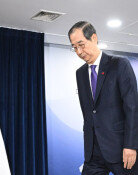Citigroup Rules Out Possibility of Korea Default
Citigroup Rules Out Possibility of Korea Default
Posted November. 01, 2008 03:02,
With the Bank of Korea signing a currency swap with the U.S. Federal Reserve Board and the pledge of the International Monetary Fund to provide liquidity for emerging economies, U.S. financial institutions say the risks threatening Korea have been significantly lowered.
In a report on the Korean economy released Thursday, Citigroup said the provision of dollar liquidity will contribute to stabilizing the Korean financial market, saying, Given sound economic fundamentals and sufficient liquidity, the odds of Koreas default has effectively fallen to zero.
Koreas dollar liquidity of more than 69 billion dollars is enough to ease certain jitters over the possibility of liquidity crisis or default. If Korea decides to resort to all kinds of available dollar liquidity, its foreign exchange reserves will reach 300 billion dollars.
The report said Koreas default risk has significantly decreased, namely its three risk factors of global economic slowdown, credit crunch in the domestic market, and default, but added the two other risk factors will burden on the financial market.
This means Korea should not expect that an increase in dollar liquidity will immediately normalize the financial market.
Merrill Lynch also described the currency swap agreement between Korea and the United States as "notable progress," saying Korea is obviously a beneficiary of the Feds currency swap agreement with four economies.
Since 1946, advanced nations have provided liquidity for emerging economies via the IMF. The currency swap agreement between the U.S. and Korea seems to the first of its kind, which is really exceptional. In its announcement, the Fed described Korea and Singapore as fundamentally sound and well managed economies. It can send positive signals, Merrill Lynch said.
Goldman Sachs said the agreement will ease investor jitters and help the won stabilize. The deal and the Korean governments promise to guarantee commercial banks external debts will be a big help for commercial banks to roll over their debts, it added.
higgledy@donga.com







